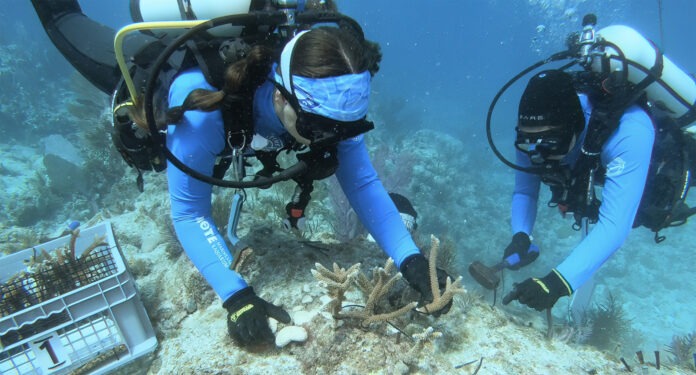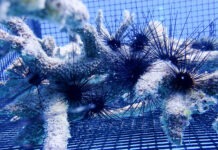
Florida Keys coral restoration groups and scientists from the Florida Keys National Marine Sanctuary planted resilient, heat-resistant species of coral at Carysfort Reef on Jan. 28, commemorating the fifth anniversary of the sanctuary’s Mission: Iconic Reefs program.
The program was established with the goal of strengthening and restoring seven iconic coral reef tracts in the Florida Keys. The undertaking encountered a major challenge due to a marine heat wave in the summer of 2023 that caused devastating mortality at many restoration groups’ in-water coral nurseries and areas of the Florida reef.
From that challenge, though, came discoveries regarding coral survival in the face of future climate change, researchers said, adding that coral reefs around the world are also confronted with such issues.
“They’re actually using genets, or clone lines, of coral that we know are resistant to heat stress,” said Katey Lesneski of the divers involved in the outplanting at Carysfort, located off Key Largo. “We’ve done a fantastic job across so many organizations of preserving genetic diversity which will be important in future outplanting efforts.”
Lesneski is the sanctuary’s Mission: Iconic Reefs research and monitoring coordinator.
“So these individuals have been propagated from others that survived the heat stress event in 2023, whether out on the reef or in ocean-based nurseries,” Lesneski said, referring to the infant corals. “So we have a lot of confidence that the corals that are being returned to the reef today will continue to do well even in future warming conditions.”
The three organizations that aided in outplanting the young corals are Coral Restoration Foundation, Mote Marine Laboratory and Reef Renewal USA.
In the future, sanctuary officials hope to bring in more coral restoration organizations and research partners with additional concepts about how to build on information learned so far, according to Lesneski.
For more than 20 years, organizations in the Florida Keys have pioneered breakthrough efforts to restore coral.
“Florida’s coral reef provides billions of dollars in revenue annually,” Lesneski said. “And if we want generations in the future to enjoy these same benefits, we have to continue to do this work and preserve this very important resource.”





















